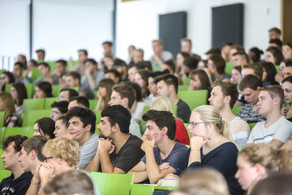Dr. Anna K. Nishen
Arbeitsschwerpunkte
- Einfluss von Gruppenzugehörigkeiten (sog. Migrationshintergrund, Geschlecht) in der Schule
- Verzerrungen in Feedback und Beurteilungen
- Implizite Theorien von Lehrkräften
Sprechstunde
Dienstags 14-16 Uhr und nach Absprache
Weitere Informationen
Seit 09/2022
Wissenschaftliche Mitarbeiterin
Lehrbereich für Kinder- und Jugendpsychologie im Bildungskontext (Jun.-Prof. Dr. Sebastian Bergold)
und Lehrbereich für Pädagogische und Differentielle Psychologie (Prof. Dr. Ricarda Steinmayr)
Technische Universität Dortmund
11/2022
Disputation
Titel: „A positive bias towards negatively stereotyped students? Teacher students’ feedback to and judgments of students with a Turkish vs. a German name“
2019-2022
Wissenschaftliche Mitarbeiterin
Arbeitsbereich Bildungsforschung/Heterogenität und Bildung (Prof. Dr. Ursula Kessels)
Freie Universität Berlin
2017 –2019
M.Sc. Behavioral Sciences
Radboud Universität Nijmegen, NL
2013 – 2017
B.Sc. Psychologie
Universität Mannheim
Zeitschriftenartikel (peer-reviewed)
Nishen, A. K., Corcoran, K., Holder, K., & Kessels, U. (2022). When ethnic minority students are judged more suitable for the highest school track: A shifting standards experiment. European Journal of Psychology of Education. Advance Online Publication. doi.org/10.1007/s10212-021-00595-5
Nishen, A. K. & Kessels, U. (2022). Evaluating vs. giving feedback on students’ essays: Is feedback inflation larger for students with a migration background? Social Psychology of Education, 25, 1–31. doi.org/10.1007/s11218-021-09674-3
Streck, H., Nishen, A. K., & Kessels, U. (2022). Instrumentality gives girls the edge: Gender-differential relationships between instrumentality, achievement motivation, and self-esteem. Sex Roles, 86, 379–394. doi.org/10.1007/s11199-021-01270-1
Marksteiner, T., Nishen, A. K., & Dickhäuser, O. (2021). Students’ perception of teachers’ reference norm orientation and cheating in the classroom. Frontiers in Psychology, 12, Article 614199. doi: 10.3389/fpsyg.2021.614199
Buchkapitel
Kessels, U. & Nishen, A. K. (in press). Shifting Standards und positiver Feedback-Bias: Wenn negative Stereotype zu positiveren Urteilen führen [Shifting standards and the positive feedback-bias: When negative stereotypes lead to more positive judgments]. In S. Glock, Stereotype in der Schule. Springer.
Kessels, U., Nishen, A. K., & Schieck, D. (2021). Segregation und Zugehörigkeitsgefühl in heterogenen Klassen [Segregation and sense of belonging in heterogeneous classrooms]. In D. Raufelder & G. Hagenauer (Eds.) Soziale Eingebundenheit (pp. 99–112). Waxmann.
Nishen, A. K. & Kessels, U. (2022, September). Was liegt dem positiven Feedback-Bias gegenüber türkischstämmigen Schülern zugrunde: Shifting Standards oder die Motivation, keine Vorurteile zu haben? [What is the basis of the positive feedback bias towards Turkish-German students: Shifting Standards or the motivation to not be prejudiced?] [Paper presentation]. 52. Kongress der Deutschen Gesellschaft für Psychologie, Hildesheim, Germany.
Kessels, U., Holder K., Nishen, A. K., & Corcoran, K. (2022, March). Shifting Standards bei der Bewertung negativ stereotypisierter Gruppen [Shifting standards in the evaluation of negatively stereotyped groups]. In L. Keller & M- Brunner (Chairs), Intersektionalität in Bildungskontexten: Quantitative Ansätze und Befunde. Symposium conducted at the 9th Conference of the Society for Empirical Educational Research, Bamberg, Germany.
Nishen, A. K. & Kessels, U. (2022, March). Experimental evidence for feedback inflation and the Positive Feedback Bias: Judgments of vs. feedback to students with German and Turkish names [Paper presentation]. Conference of Experimental Psychologists, Cologne, Germany.
Nishen, A. K., Schieck, D., & Kessels, U. (2022, March). Sorgen von Lehramtsstudierenden zum Umgang mit ethnisch-kultureller Heterogenität [Concerns of teacher students regarding the handling of ethnic-cultural heterogeneity] [Paper prasentation]. 9th Conference of the Society for Empirical Educational Research, Bamberg, Deutschland. gebf2022.de/GEBF2022_Tagungsband_01-03-22.pdf
Nishen, A. K., Corcoran, K., Holder, K., & Kessels, U. (2021, August). Surprisingly good? The role of shifting standards in school tracking recommendations for boys and girls with and without a migration background [Paper presentation]. 3rd Cultural Diversity, Migration, and Education Conference, Potsdam, Germany.
Nishen, A. K. & Kessels, U. (2021, March). Feedback vs. Beurteilungen: Geben Lehramtsstudierende übermäßig positives Feedback eher an Schüler mit türkischem Migrationshintergrund? [Feedback vs. evaluations: Do teacher students give overly positive feedback more readily to students with a Turkish migration background?] [Paper presentation]. Conference of the Berlin Interdisciplinary Education Research Network, Berlin, Germany.
Nishen, A. K. & Kessels, U. (2021, May). Thinking too much? Pre-service teachers give overly positive feedback to ethnic minority students [Paper presentation]. EARLI SIG-16 Metacognition online conference.
Nishen, A. K. & Kessels, U. (2021, August). Evaluating vs. Giving Feedback: Is Feedback Inflation Larger for Ethnic Minority Students? [Paper presentation]. EARLI 2021 online conference, Gothenburg, Sweden.
Nishen, A. K. & Kessels, U. (2021, September). Angst zu kritisieren? Positiver Bias beim Feedback an Schüler mit und ohne Migrationshintergrund [Afraid to criticize? The Positive Feedback Bias in feedback to students with and without a migration background] [Paper presentation]. 18th Conference of the Fachgruppe Pädagogische Psychologie of the German Psychological Society, Heidelberg, Germany.
Nishen, A. K., Schieck, D., & Kessels, U. (2021, August). Would that be racist? Constructing a scale on teacher students’ concerns about cross-ethnic teaching [Roundtable presentation]. JURE 2021 online conference, Gothenburg, Sweden.
Streck, H., Nishen, A. K., & Kessels, U. (2021, September). Maskulinität und Leistungsmotivation: Direkte und Indirekte Wege [Masculinity and achievement motivation: Direct and indirect paths] [Paper presentation]. 18th Conference of the Fachgruppe Pädagogische Psychologie of the German Psychological Society, Heidelberg, Germany.
Nishen, A. K., Burk, W., & Cillessen, A. T. H. (2019, March). Friendship influence across transitions: Predicting early adult mental health from friends’ mental health in adolescence. In B. Laursen (Chair), Peer influence: New methods for unpacking longitudinal effects. Symposium conducted at the biennial meeting of the Society for Research on Child Development, Baltimore, MD.
Nishen, A. K., Marksteiner, T., & Dickhäuser, O. (2017, March). Warum mogeln Schüler? Effekte der Bezugsnormorientierung von Lehrkräften auf Mogelverhalten [Why do students cheat? Effects of teachers‘ reference norm orientations on cheating] [Poster presentation].5th conference of the Society for Empirical Educational Research 2017, Heidelberg, Germany.
Nishen, A. K., Preston, O., Brule, H., & the Learning. Garden Assessment Group (2016, May). Predicting academic motivation: Contextual supports for diverse students’ engagement and everyday resilience [Poster presentation]. Annual Conference of the Oregon Psychological Association, Portland, OR.






